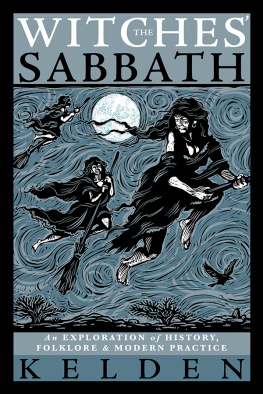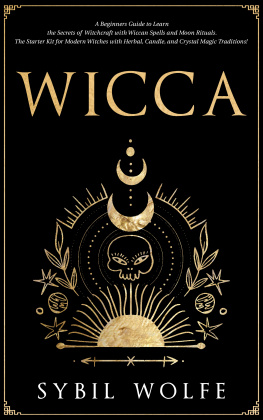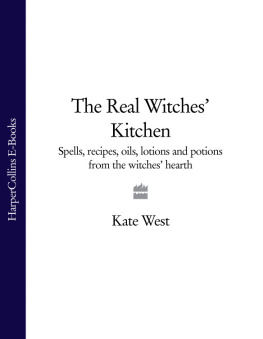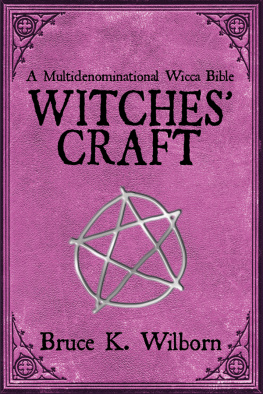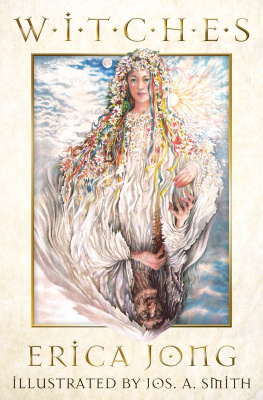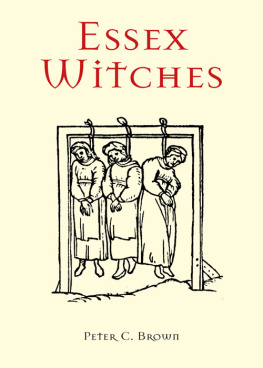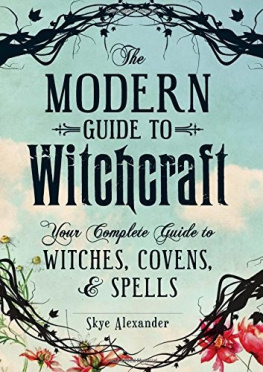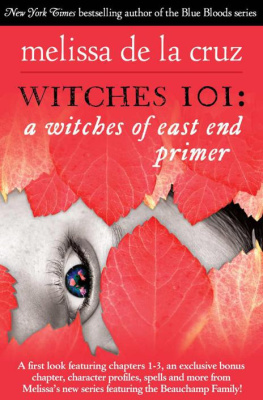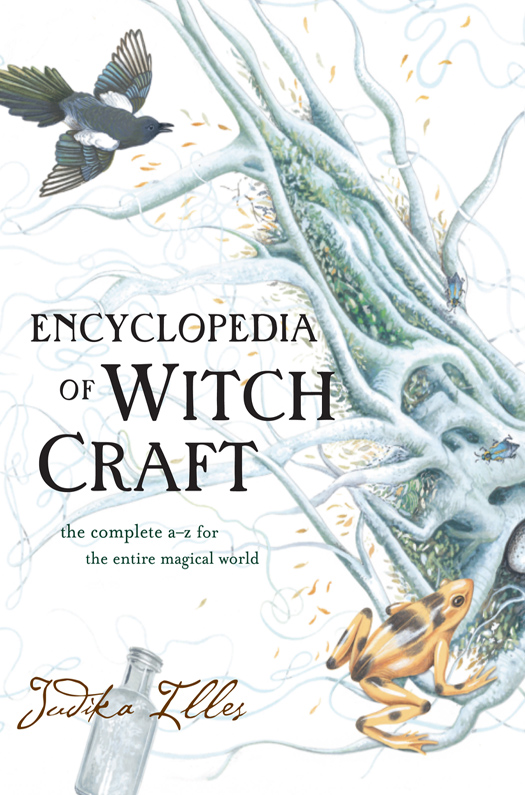For Clara Fisher and Irma Illes, with love
In memory of Zsuzsanna and Margit Grosz
Contents
Many things have changed since I wrote the original manuscript of The Element Encyclopedia of Witchcraft. Absinthe is no longer illegal. Death midwifery has been revived. Films long lost have since been found. Thanks to the success of the Marvel movie franchise, comic books and their characters are no longer obscure; in fact, quite the opposite. Hoodoo and the Fairy Faith have experienced a renaissance.
Unfortunately, some things have not changed. In 2004, I wrote: Although the Witchcraze eventually burned itself out in Europe, todays newspapers periodically, with some frequency, report the brutal murders of people identified as witches in India and throughout Africa. Now, at the beginning of the twenty-first century, it is still not safe, depending where youre located, to be branded a witch.
Ten years later, this statement remains true, the only difference being that the frequency has increased and the territory has expanded. According to Amnesty International, in 2009 approximately one-thousand accused witches in Gambia were locked in detention centers. Throughout Africa, thousands of children have been abandoned on suspicion of being witches. Also in 2009, a special anti-witchcraft task force was created by the government of Saudi Arabia, leading to numerous arrests and executions. This unit provides complete confidentiality to informants, just as the Inquisition once did in Europe. In December 2013, The Times of India reported that, despite laws introduced to combat the phenomenon, witch hunts continue unabated, especially in rural areas. Their study indicates that many of these cases are rooted in property disputes, just as so many witch hunts were centuries ago during Europes Burning Times.
Dear readers, I am honored and delighted to be able to share my love of witchcraft and all things witchy with you: the spells, the spirits, the revelry, knowledge, and power. I fervently hope that, in years to come, witch hunting will only be remembered as a shameful and archaic thing of the past and that witches or those suspected or accused of being witches are safe, protected, and appreciated.
Judika Illes, Beltane 2014
Most of my clothes are black. I have a black cat. My favorite holiday is Halloween. I have perpetually unruly hair. Given the right company, I will happily chatter on about astrology, magic, herbs, and divination. I write books of magic spells. So perhaps its not surprising that periodically Im asked whether Im a witch.
Invariably, my response is to say that my answer depends upon the inquirers definition of witchcraft. Inevitably this leads to frustration (and often to anger) on the part of the inquirer: they think theyve asked a very simple, straightforward question because, of course, every child, any idiot so to speak, knows the definition of witch. Their perception is that Im being snippy and evasive (stereotypical witch behavior, incidentally) when in fact Im just wary. Ive already experienced too many unpleasant encounters with those whose definitions of witchcraft did not correspond with my ownor with each others for that matter. Ive learned that, just like beauty, what constitutes witchcraft is dependent upon the eye of its beholder.
Dont believe me? Lets look in the dictionary.
The following definition is from Websters Seventh New Collegiate Dictionary:
WITCH (n ME wicche fr. OE wicca, masc. wizard and wicce fem. witch; akin to MHG wicken to bewitch, OE wigle divination, OHG wih holymore at victim)
1a. Wizard, Sorcerer
1b. a woman practicing the black arts: SORCERESS
1c. one supposed to possess supernatural powers esp. by compact with devil or familiar
1d. or Witcher: Dowser
2. an ugly old woman: HAG
3. a charming or alluring woman
Oh boy, weve got some contradictions right there. Which witch does my inquirer suppose me to be? Should I take the question as a compliment or as an insult? Its probably safe to presume that most women wouldnt strongly object to the insinuation that theyre charming or alluring but what if the witch this particular questioner has in mind is actually that ugly old hag or Satans minion?
Hags, wizards, compacts with the devil: these definitions, or at least the words used to express them, demonstrate an archaic tone. In all fairness, I grabbed the first dictionary at hand. The definition quoted above comes from a well-worn 1965 edition, not that long ago considering the entire scope of time, but still, perhaps a newer edition might offer a more modern definition. With the wonders of modern technology and automatic updates, Merriam-Websters Online Dictionary is about as up-to-date as dictionaries get, yet its definition of the word witch is similar to the one from 1965 with but one significant addition:
WITCH
1: one that is credited with usually malignant supernatural powers; especially: a woman practicing usually black witchcraft often with the aid of a devil or familiar: SORCERESScompare WARLOCK
2: an ugly old woman: HAG
3: a charming or alluring girl or woman
4: a practitioner of Wicca
Now in addition to practicing usually black witchcraft the witch may also be a practitioner of Wicca although whether Wicca and black witchcraft are different or synonymous is not addressed.
Both dictionary definitions link witches with women; at least that much seems clear. Or is it? The further one searches for a definitive definition of the witch the more elusive and labyrinthine the subject becomes.
Other references suggest a narrower definition of witchcraft, albeit with greater flexibility regarding gender. According to Dr Margaret Alice Murray, the controversial scholar who wrote a long-standing definition of witchcraft for the Encyclopedia Britannica, the word witch has been used since the fifteenth century almost exclusively to describe persons, either male or female, who worked magic.
Funk and Wagnalls Standard Dictionary of Folklore, Mythology and Legend further clarifies this issue of gender. That book defines a witch as
a person who practices sorcery; a sorcerer or sorceress; one having supernatural powers in the natural world, especially to work evil and usually by association with evil spirits or the Devil: formerly applied to both men and women but now generally restricted to women. Belief in witches exists in all lands, from earliest times to the present day.
Although Margaret Murrays definition is neutral in tone, the others possess, to varying degrees, an air of malevolency. So perhaps I should be insulted at the suggestion that Im witchy.
You want a really virulent definition of witch? Try this one:
Witches are the devils whores who steal milk, raise storms, ride on goats or broomsticks, lame or maim people, torture babies in their cradles, change things into different shapes so that a human being seems to be a cow or an ox and force people into love and immorality.
Martin Luther, 1522
Perhaps not. Maybe I should be flattered. Author Raymond Buckland, a pivotal figure in the evolution of modern Wicca and an authority on magic, divination, and witchcraft, acknowledges the very same etymology quoted in the dictionaries yet proposes a positive understanding of the word

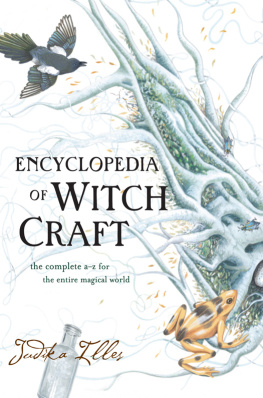
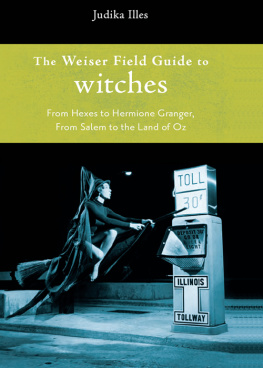
![Illes - The element encylopedia of 5000 spells: [the ultimate reference book for the magical arts]](/uploads/posts/book/203560/thumbs/illes-the-element-encylopedia-of-5000-spells.jpg)

